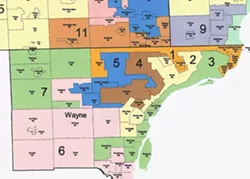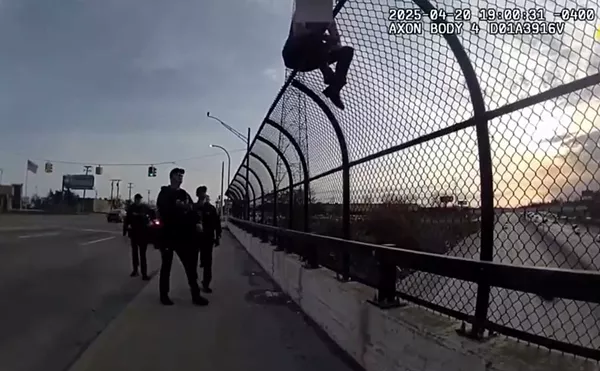
Audio By Carbonatix
[
{
"name": "GPT - Leaderboard - Inline - Content",
"component": "35519556",
"insertPoint": "5th",
"startingPoint": "3",
"requiredCountToDisplay": "3",
"maxInsertions": 100,
"adList": [
{
"adPreset": "LeaderboardInline"
}
]
}
]

Map of U.S. House districts in Southeastern Michigan
The grassroots organization is devoted to ending gerrymandering, or the manipulation of political district boundaries in favor of a particular party, in Michigan. Its committee is currently unhappy with the state's Bureau of Elections, claiming they are taking far too long to review a proposed petition.
The committee says it had originally planned to start collecting signatures this week for a 2018 ballot proposal that would generate an independent commission to decide upon political boundaries. Per the proposed petition, the commission would be comprised of 13 people: four self-identifying Democrats, four self-identifying Republicans and five "non-affiliated" independents. The goal of the commission would be to end what VNP views as longstanding control of the districts by select politicians,.
However, the group says the bureau has yet to complete a review of petition language that was submitted on June 28.
"We submitted our [petition] language going on 20 days now, and we’ve been talking to the Bureau of Elections for several months," says Katie Fahey, president and treasurer of Voters Not Politicians.
"In direct communication to us, they said that they normally strive to review and give feedback on constitutional language within 24 hours ... What we’ve seen is that other petitions have been able to get through this process a lot faster, and we’re not receiving any kind of time frame," she says. "Our issue is that we feel like we’re not being treated equally, as other organizations have, when just trying to go through this administrative process."
Should the group's proposed commission come to fruition, it would be required to hold a minimum of 10 hearings throughout the state before drafting a redistricting plan, and would be required to publish all proposed redistricting plans. From there, it would need to hold at least five additional public hearings for each.
The commission would also have to observe certain criteria in creating districts of equal population that reflect the state's diversity and show consideration of community borders. But for any of this to take place, VNP's petition needs approval.
"Often, when you see a petition, it’s got private interests, not that that’s necessarily bad, but they have a lot of money and organizational power that ends up paying for signatures," Fahey says. "Right now, we are planning on using people power to gather signatures ... We only have 180 days, and we’d like to do that during the summer because of all the wonderful festivals going on around the state, but also, it’s just a lot nicer to go outside and gather signatures, talk to people."
This may sound like an awful lot of trouble to go through for a mere chance at making change, but Fahey is focused on the bigger picture.
"[Our goal] is to have a fair and transparent process around redistricting so that when people go to vote in Michigan, their votes are being counted, and they’re able to obtain representative government that can advocate for them at the state and federal level," she says. "We don’t want to make any assumptions, but [the bureau] let us know that the staff has higher priorities ... I’m not exactly sure why [this is happening]; I just know that we would like to see movement on this."
A spokesman with the state Bureau of Elections says it tends to take longer to look over petitions seeking constitutional amendments and that the VPN petition is 8 pages long.
Spokesman Fred Woodhams says, ultimately, submitting language to the state's Board of Elections is a voluntary step. Said Woodhams, "It's a free legal review to ensure their petition is not invalidated by a judge when they turn in petition signatures."
Tess Garcia is a summer intern covering news, culture, and more for the Metro Times. She is a sophomore at the University of Michigan studying Communications and Social Theory and Practice.






